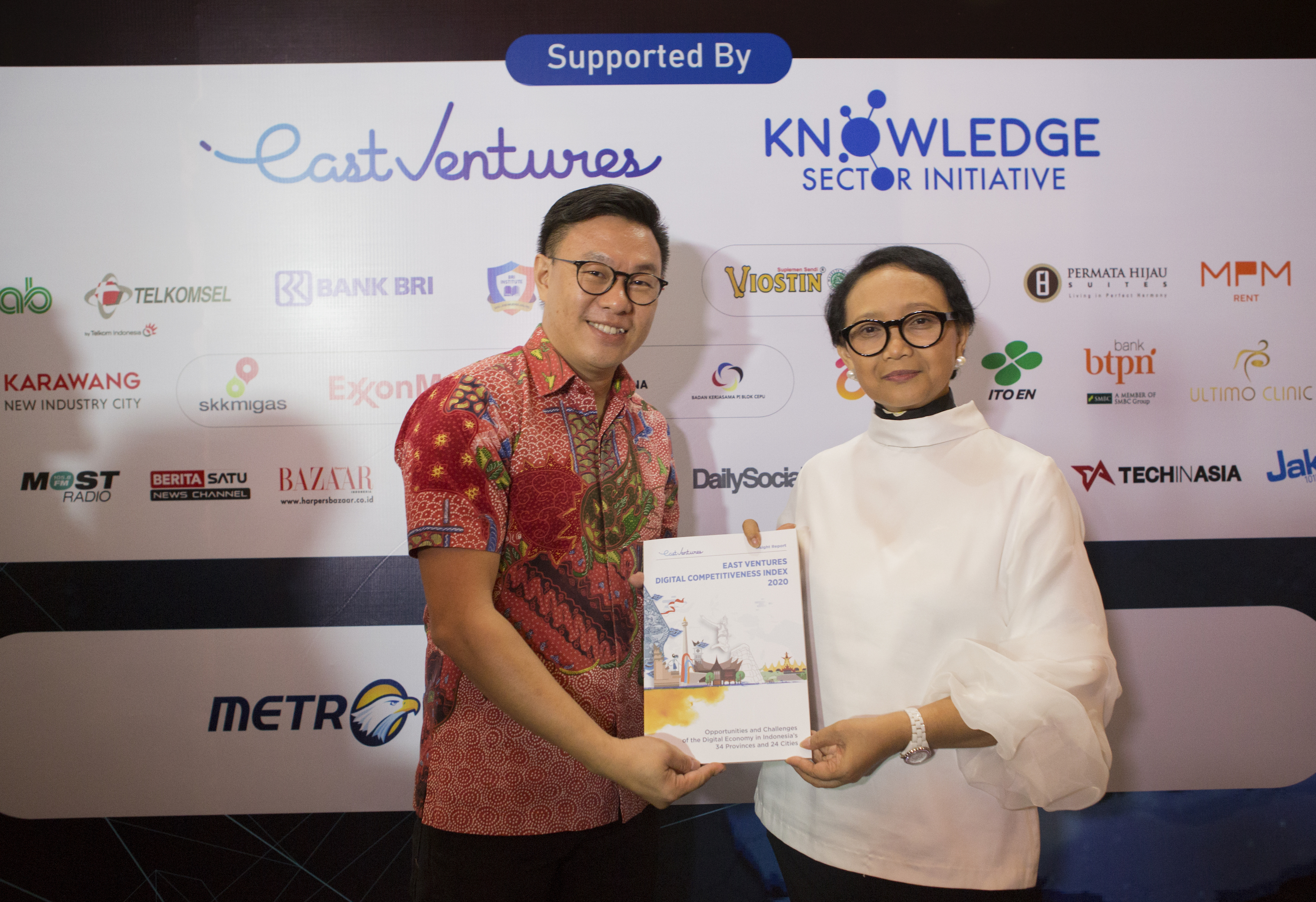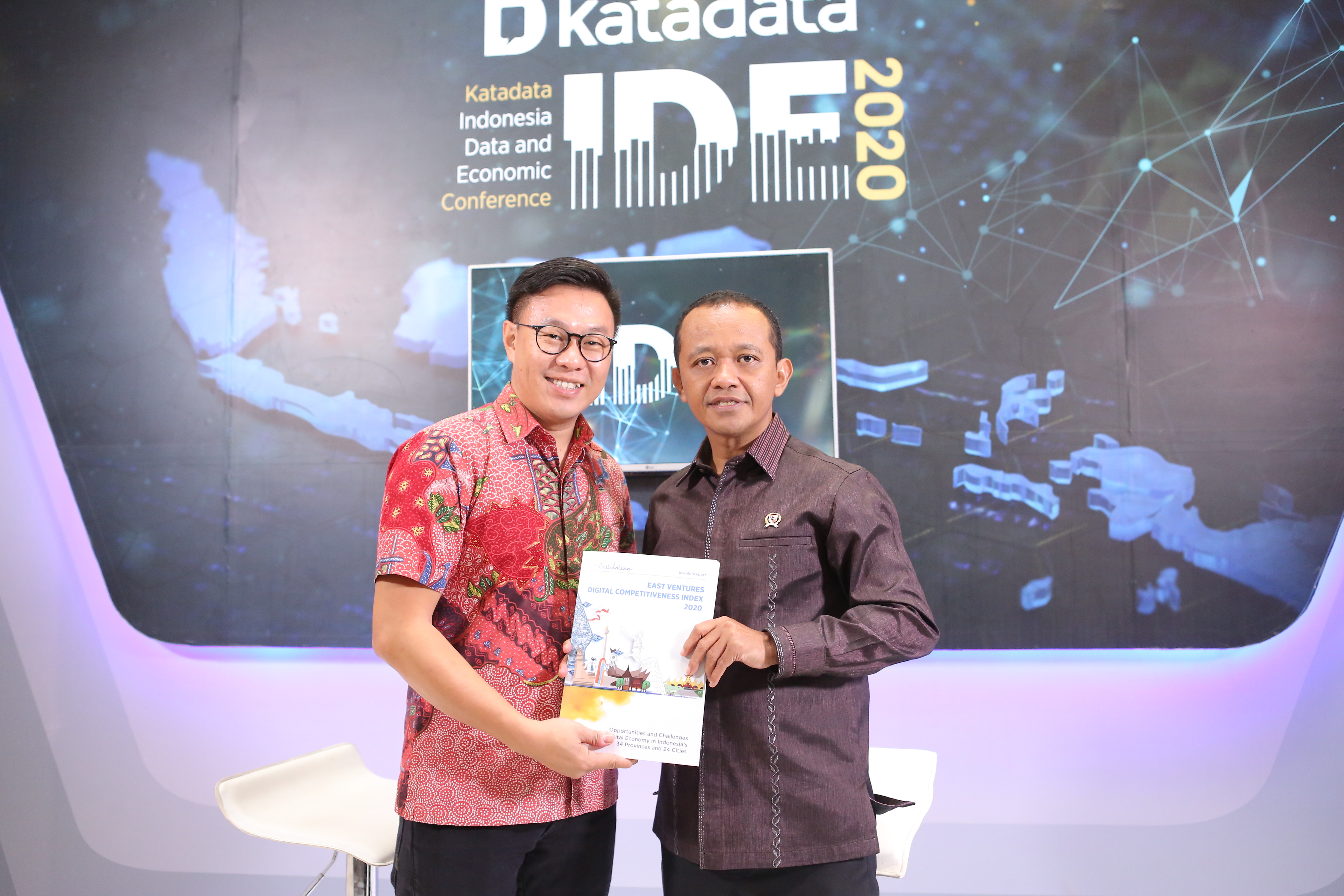Jakarta, 30 January 2020 – East Ventures, the pioneer of Indonesia’s early-stage venture capital scene, today released its first report named East Ventures – Digital Competitiveness Index (EV-DCI) 2020. The objective of the report is to map out the digital economic growth of the 34 provinces and 24 big cities across Indonesia.
The rapid development of the digital economy in Indonesia only occurs in urban areas and several other provinces with high technology early-adopters. This has led to a digital divide between Indonesia’s numerous islands as the largest archipelago in the world.
East Ventures Digital Competitiveness Index (EV-DCI) serves as a tool to map the digital economic conditions in all parts of Indonesia based on 9 pillars related to the digital economy and supporting aspects that indirectly support the development of the digital economy.
With clear mapping and a full picture of Indonesia’s digital economy, strategic steps can be taken to equalize digital access and technological capabilities throughout the country, especially in this era of knowledge-based economies.
Data from the report shows that Indonesia’s overall digital competitiveness records a high competitiveness score for the communication and information technology utilization aspect, which means that it has a high level of technology adoption on smartphone ownership and internet access. Indonesia also scores high for the infrastructure aspect, indicating that cellular data networks have been more evenly distributed across the country.
On the other hand, the aspects of human resources and entrepreneurship receive the lowest score. This indicates that Indonesia still faces tech talent scarcity due to the limitations of educational institutions to produce a skilled technology and information workforce. Furthermore, the low entrepreneurial score shows that only a small number of Indonesians are opening businesses or utilizing technology in their workplace.
The provinces in the island of Java records the highest Digital Competitiveness Index score in comparison to all other provinces. This evidently shows the gap between Java and other Indonesian regions. Furthermore, the EV-DCI score for cities highlights a developmental inequality with a huge gap between the city that ranked first, Jakarta, and the city that ranked second, Bandung.

Co-founder and Managing Partner of East Ventures, Willson Cuaca, said that the mapping this report presents was East Ventures’ contribution in bringing the entire country together to enjoy the digital revolution as we do not want to leave anyone behind.
He explained that digital companies founded by local and young entrepreneurs have successfully increased economic access and productivity in the major cities of Indonesia, especially in Jakarta. The inequality revealed by EV-DCI can assist giant companies such as Gojek, Tokopedia, and Traveloka to continue expanding their wings to other parts of the country.
Several other technology companies have also served other regions of Indonesia. Education platform Ruangguru, has been used by students in all 34 provinces. IDN Media’s writer community has presence in each part of Indonesia. Moka POS has enabled SMEs in Papua to use cloud-based cashier applications. Sirclo has supported online sellers located in places like East Nusa Tenggara, while Airy has partnered with property owners in cities as far as Bitung and Samosir.
Willson explained further that the cities with the highest EV-DCI score are the best places to start a new digital business as the likelihood of early adoption is high.
“The digital economy promises inclusivity and equal economic opportunities for all Indonesians. However, Indonesia is often times only assessed from the development of certain big cities like Jakarta, while there are still many cities untouched by the promise of digital economy. By allowing everyone to participate in the digital economy, Indonesia could convert demographic bonuses into demographic dividends; turning potential into reality.”
Some key highlights of the report:
- The growth of the digital economy creates a more competitive talent market and produces a skilled workforce. Though areas with high digital competitiveness tend to absorb more of these professionals and skilled workers.
- Several jobs such as administrative work, machine operators, and laborers are expected to be impacted the most by digitalization. Evidently, the number of these workers in the ICT, finance, and transportation industries has been facing the sharpest decline.
- West Java sits as the province with the best source of a skilled digital workforce, students, and lecturers, as well as the availability of school programs related to digital skills.
- Digital competitiveness in areas planned to be the ‘New Bali’ such as Labuan Bajo, Lake Toba, Raja Ampat, Borobudur Temple, Mount Bromo, and Morotai must be improved to provide access to information, comfort, and attractiveness for foreign tourists.
East Ventures expresses that all data compiled in EV – Digital Competitiveness Index is not intended to be a conclusion. This index is only the starting point towards the next phase of Indonesia’s digital transformation. The firm is eager to encourage all stakeholders to get involved and take advantage of the positive impacts of the digital economy.
The full report can be downloaded freely through: east.vc/dci
***
About East Ventures
East Ventures is the first early-stage investor in Indonesia and stands amongst the most consistently top-performing venture capitals globally with a constantly high IRR. Established since 2009, the firm has supported more than 170 digitally-enabled companies in Southeast Asia, with 130 companies founded in and operating in Indonesia.
Indonesia is the world’s largest archipelago consisting of more than 17,000 islands; and home to 264 million people, ranking it as the most populous country in Southeast Asia and the 4th globally. Indonesia’s growing young and middle-class population is the country’s unparalleled growth engine- its productive population (age 15 to 64) will be 179.1 million people in 2020, a size triple the population of the United Kingdom. . Indonesia was crowned as the largest and fastest-growing country for the internet economy in Southeast Asia. In 2019, its internet economy reached US$40 billion and is well on track to cross the US$133 billion mark by 2025.
East Ventures has worked alongside entrepreneurs to build Indonesia’s digital ecosystem from the ground up since day 1. Spotting opportunities early, the firm is the first venture capital to support Indonesia’s two homegrown unicorns: Tokopedia and Traveloka. The firm has since then invested in other industry themes, including supporting infrastructure to e-commerce such as Waresix (logistics), Xendit (payment), Kudo (offline to online), Shopback (e-commerce enabler), vertical commerce such as Sociolla (new retail beauty), media such as IDN Media (millennial and gen-z audience), Tech in Asia (tech audience), and Katadata (business and economy audience), SME support such as Mekari (accounting, tax, payroll), Moka (POS), CoHive (coworking), new retail such as Warung Pintar (FMCG) and Fore Coffee (on-demand coffee chains), and digital transformation such as Advotics (supply chain analytics) and Nodeflux (computer vision and AI).
Over the past decade, the firm has grown its Southeast Asian assets reaching US$1.2 bn under management for both the early-stage and growth funds. The firm has delivered more than 20 exits, including Kudo’s acquisition by Grab, Loket’s acquisition by Gojek, Bridestory’s acquisition by Tokopedia, and multiple exits to both local and regional business groups. It has also attracted a total of US$4 bn in follow-on funding that fostered the growth of Indonesia’s digital economy today.







